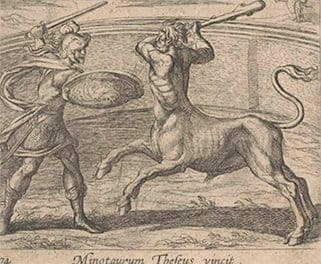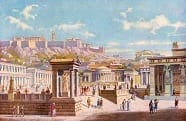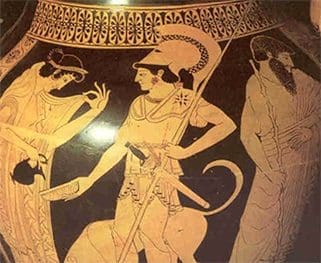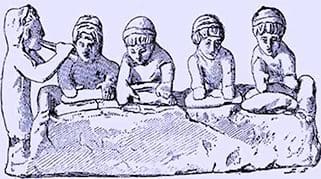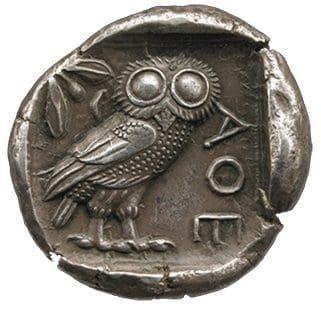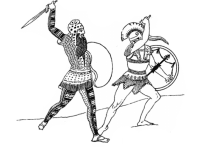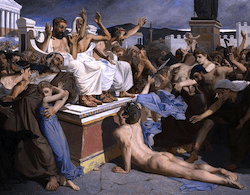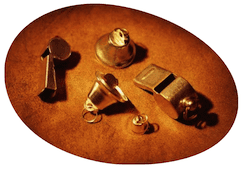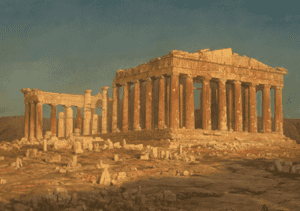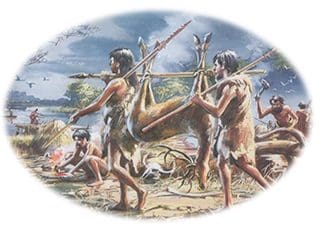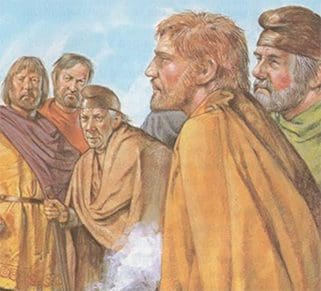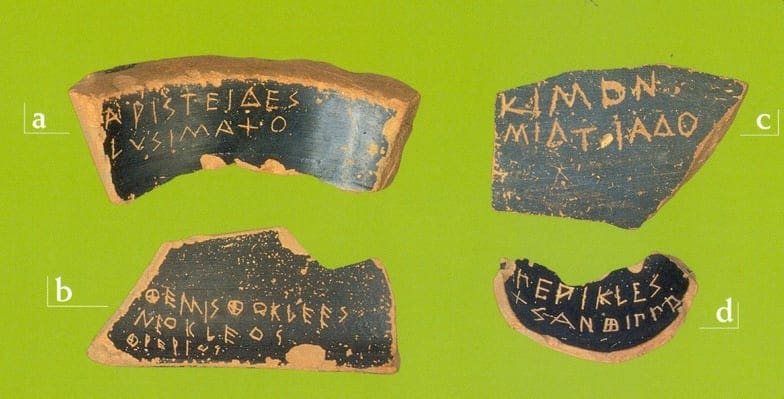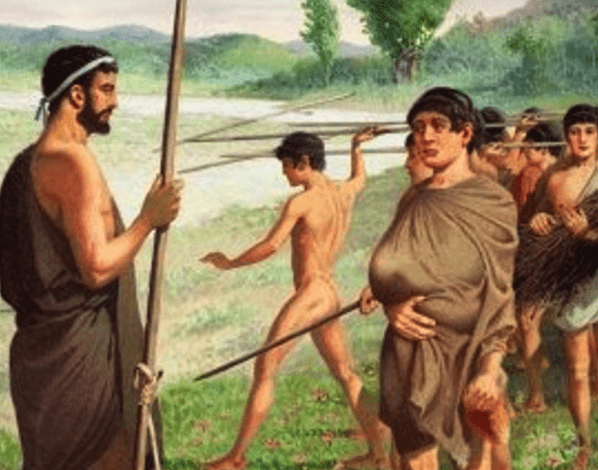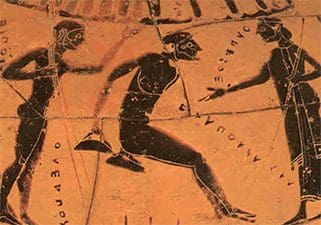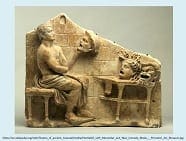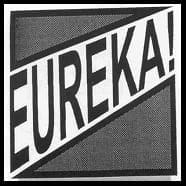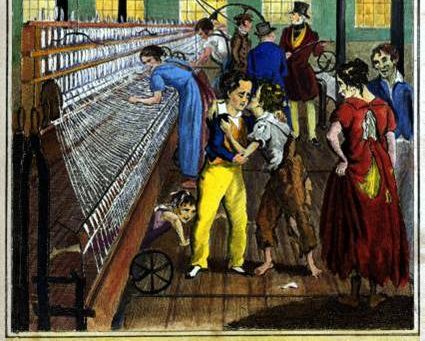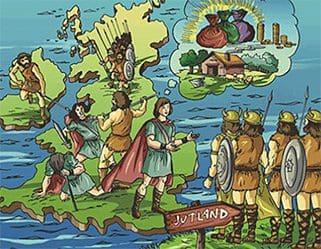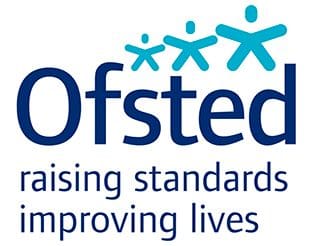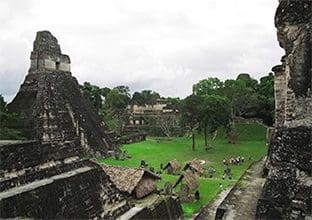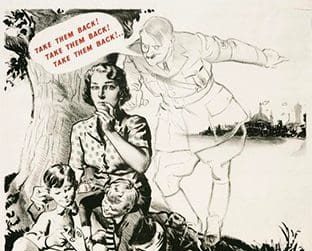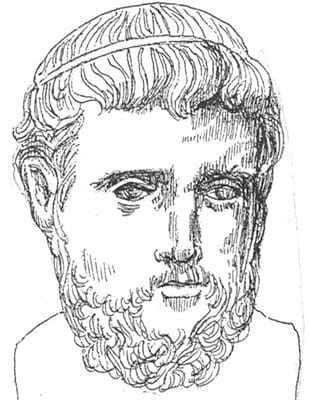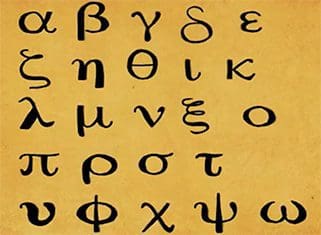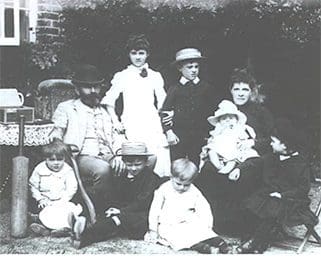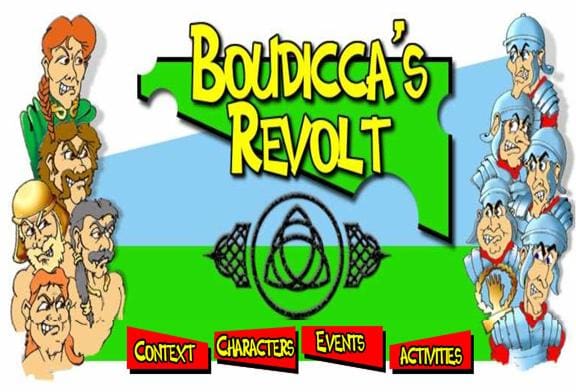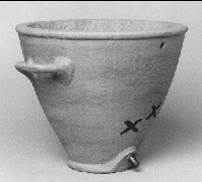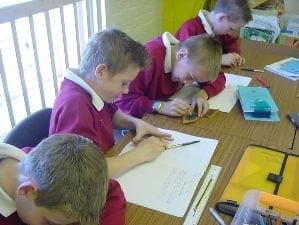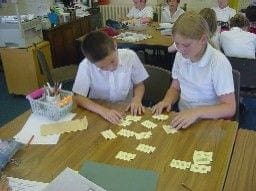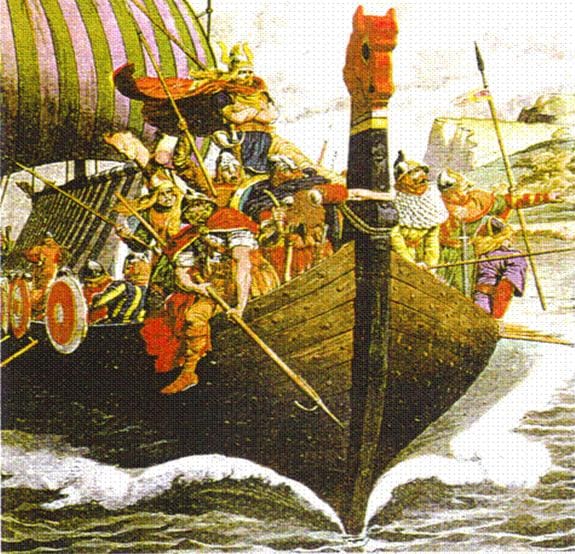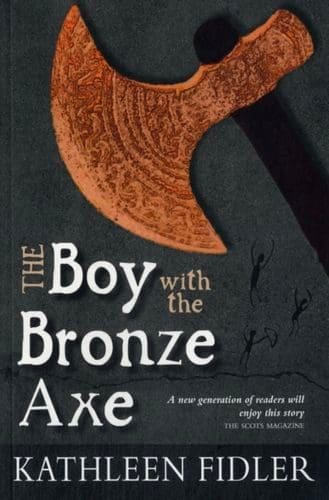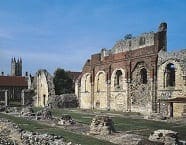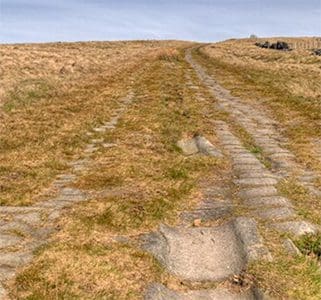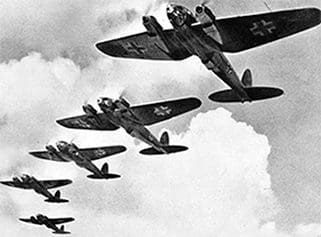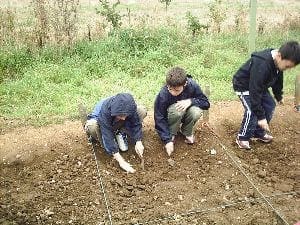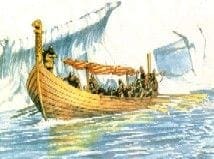Teaching history at Key stage 2 (KS2)
Ancient Greece – KQ1 Part 2 – Background information
This short article provides some background information to support your teaching of Key Question 1 Part 2. Set the lesson…
Read MoreAncient Greece – KQ2 Part 1 – What can we work out about everyday life in Ancient Athens?
There are three distinct parts to Key Question 2 but each centrally based around the need for pupils to use…
Read MoreAncient Greece – KQ2 Part 2 – Ancient Greek vases: the answer lies on the pot
This KS2 history lesson, in which the decoration of a Greek pot is slowly revealed, features two cracking activities designed…
Read MoreAncient Greece – KQ2 Part 3 – What was life like for women in Ancient Greece?
This simple lesson on life for women in Ancient Greece, based around a PowerPoint presentation, makes an excellent contribution to…
Read MoreAncient Greece – KQ3 Part 1 – Why was Athens able to be so strong in the 5th and 6th century BC?
As well as recapping Athens’ natural advantages (coastline to trade by sea, expand into colonies and capture slaves) and their…
Read MoreAncient Greece – KQ3 Part 2 – The Battle of Marathon. A history mystery
This lesson on the Battle of Marathon makes a major contribution to pupils’ thinking skills. They are presented with a…
Read MoreAncient Greece – KQ3 Part 3 – comparing six contrasting interpretations of the original Marathon run
Interesting session comparing six contrasting interpretations of the original Marathon run, followed by analysis of which to believe and understanding…
Read MoreAncient Greece – KQ3 Part 3 – Additional Information – 10 Things Your Pupils Need To Know About Pheidippides ’Marathon’ Run
1. Herodotus makes no mention of the run from Marathon to Athens The principal source for the battle of Marathon…
Read MoreAncient Greece – KQ3 Part 4 – Consequences of the battle of Marathon: Bells and whistles – Smart task
Really fun lesson called bells and whistles in which team have to make the appropriate sound depending on whether the…
Read MoreAncient Greece – KQ4 Part 1 – role play on building the Parthenon
This full lesson is a role-play activity looking at Greek democracy in the context of the rebuilding of the Parthenon….
Read MoreTop Tips for teaching….Stone Age to Iron Age
Stone Age to Iron Age The British Isles has been populated by humans for 750.000 years but only became an…
Read MoreWhat have the Anglo-Saxons ever done for us? Some KS2 answers
If you asked Michael Wood what the Anglo-Saxons ever did for us he would give a very full and erudite…
Read MoreAncient Greece – KQ4 Part 2 – Making Greek democracy come to life – a ‘smashing’ lesson
This is a really fun, practical lesson involving smashed pottery, writing in Ancient Greek through black wax and deciphering each other’s…
Read MoreAncient Greece – KQ4 Part 3 – Would you have preferred to live in Athens or Sparta? Comparing life in Athens and Sparta: a short smart task
One way of bringing home to pupils what was so special about life in Ancient Athens is to compare it…
Read MoreAncient Greece – KQ4 Part 2 Additional information – Ancient Greek democracy. Or what links Red painted rope, an idiot ,and piloting the ship.
This article supports the fully resourced outstanding lesson on democracy that can be found here Democracy is made from two…
Read MoreAncient Greece – KQ5 Part 1 – What can we tell about the Ancient Greeks from a study of their Olympics?
We thought we would offer you a range of different cameos showing how the history of the Olympics could be…
Read MoreAncient Greece – KQ5 Part 2 – What can we tell about the Ancient Greeks from their interest in the theatre?
This key question is divided into two distinct parts, starting with Part 1 – the Olympics. This has its own…
Read MoreAncient Greece – KQ6 Part 1 – Under the Cloth: sorting the muddled collection. Is it all Greek to you?
Step 1 To introduce the notion of the Greeks having a major influence on our lives today use the activity…
Read MoreKeeping up-to-date with your teaching of Victorian Britain at KS2
We often talk to children about the benefits that brought so many people into industrial towns in the first half…
Read MorePush or Pull? What were the real reasons why the Saxons invaded? SMART TAKS KS2
A fun thinking skills activity in which pupils infer from visual clues before moving on to analyse a range of…
Read MoreExpert advice on local history at KS1 and KS2 by OFSTED lead inspector
Ex-subject lead for history at OFSTED has recently written this very helpful booklet for English Heritage. A great place to start…
Read MoreGuidance Non Western Civilisations: Teaching Islam/Maya/Benin
This new topic is perhaps one of the most demanding in the Key Stage 2 curriculum. Admittedly Benin and Maya…
Read MoreAncient Greece – KQ6 Part 2 – Short KS2 task on the Ancient Greek legacy: language
This is a fun activity looking at the contribution the Ancient Greeks have made to our language. Great for literacy. …
Read MoreTeaching Primary History: Life in Britain 1930-1945 at Key Stage 2
Inexplicably axed by Gove from the 2014 curriculum, my advice is to carry on teaching this highly successful unit focusing…
Read MoreAncient Greece – KQ6 Part 3 – How Great is your Greek?
Pupils have to select a team of 11 Great Greeks. They do this by preparing and then evaluating 14 different…
Read MoreAncient Greece – KQ6 Part 4 – What did the Greeks do for us? Evaluating the video
This task puts pupils in the position as evaluators of a BBC film: BBC Bitesize – Watch: What did the…
Read MoreUsing a Victorian census to discover what life was like 100 years ago SMART TASK
There are 4 separate ways of approaching this topic, each becoming increasingly more ambitious. Stage 1 only is featured below. …
Read MoreICT and Film in history at Key Stage 2
You may think it surprising that film and ICT appear together and not separately. With the advent of digitisation and…
Read MoreStrategies for using artefacts in teaching history at KS2
Nobody would seriously doubt the value of using artefacts in history at Key Stage 1, but at Key Stage 2…
Read MoreTeaching Interpretations at Key Stage 2
Although challenging, teaching interpretations in history at KS2 level is immensely rewarding when you see the ‘penny drop’ in pupils’…
Read MoreTeaching enquiry in history at Key Stage 2
You will hear a lot spoken about historical enquiry, but very little written down and easily accessible. Given its central…
Read MoreFit for purpose history teaching strategies at Key Stage 1 and 2
As primary schools have been so heavily criticised by OFSTED for failing to select strategies that are fit for purpose,…
Read MoreWhat makes an outstanding history lesson at KS2?
With very little national guidance now coming from OFSTED by way of revisions to the subject-specific criteria for outstanding primary…
Read MoreThe teaching process in history at KS2
Key Stage 2 history teaching is often unfairly caricatured as a teacher telling interested pupils lots of interesting stories: fun…
Read MoreLong-term planning at Key Stage 2
The advent of the new curriculum for history marked the most significant change in your school’s history planning for over…
Read MoreShort-term planning in history at KS2
As a rule, this site does not recommend the publication of short-term planning, preferring instead to focus on very detailed…
Read MoreHistory and literacy at Key Stage 2
Although OFSTED still points out that opportunities for exploiting the link between history and literacy are still being overlooked, the…
Read MoreViews of learners in history at Key Stage 2
There has been very little published research on the views of KS2 pupils on their history work, other than lots…
Read MoreThe learning process in history at KS2
Given that this site specialises in giving practical support to busy teachers and subject leaders, you may be surprised to…
Read MoreAre we fair to the Vikings? A question of interpretation. SMART TASK KS2
Pupils are shown a range of stereotypical images of Vikings, using slides 2 and 3. This should be used to…
Read MoreUsing Fiction: teaching Stone Age to Bronze Age in history at KS2
Using Boy with the Bronze Axe by Kathleen Fidler to help you teach Stone Age to Bronze Age and Skara…
Read MoreTeaching Local History at Key Stage 2
So, where do we start if we haven’t a clue about Local History? Unlike all other areas of study Local…
Read More50 imaginative learning activities to use in history at Key Stage 2
Currently these top 50 imaginative ideas are just listed in alphabetical order with a brief description of each, cross-referenced to…
Read MoreWhy did the Romans spend so much time building roads? KS2 short task
From Diamond 4 to ‘Roving Mike’ and kids’ wiki. This simple short task gives groups of pupils, 3 per group,…
Read MoreWhy did Germany lose the Battle of Britain?
If Britain was only a few days away from defeat in August 1940 how on earth did she win the…
Read MoreTop ten ingredients of a good KS2 post-1066 thematic unit.
Teaching Crime and Punishment as a post-1066 thematic unit at KS2 For a while now, a number of schools have…
Read MoreThinking words in primary history: my top 10
Those of you who have used a lot of the lessons on the site will know only too well that…
Read MoreRoles of learners in history at Key Stage 2
One of the best ways of exciting young children in history is to put them in role. Dorothy Heathcote’s approach,…
Read More20 creative products for history Key Stage 2
This section accompanies the ones on teaching and learning approaches. It offers you a few ideas you may not have…
Read MoreVikings: What were they like?
This lesson gives the topic on the Vikings a really active start. Pupils are placed in role as Saxon spies…
Read More
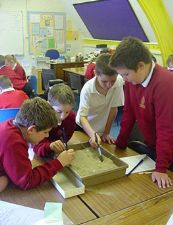 Welcome to the section for teaching history at KS2 where you will find masses of advice on how to make history both fun and satisfyingly challenging. You will be helped to design and plan an exciting primary history curriculum and taking into account the difficult areas of assessment and progression and mindful of the new focus on curriculum within OFSTED’s framework.
Welcome to the section for teaching history at KS2 where you will find masses of advice on how to make history both fun and satisfyingly challenging. You will be helped to design and plan an exciting primary history curriculum and taking into account the difficult areas of assessment and progression and mindful of the new focus on curriculum within OFSTED’s framework.